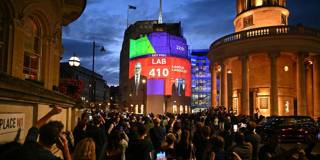Labour leader Keir Starmer’s incoming cabinet has more people of working-class origin than any British cabinet that came before it, and this remarkable feature will surely bear on policymaking. However, various countervailing forces will moderate any latent impulse to veer sharply to the left.
LONDON – The United Kingdom will have a new Labour government whose class composition will be radically different from previous ones. According to our analysis of Labour’s shadow cabinet, some 46% of Keir Starmer’s likely cabinet members were raised by parents with “working class” occupations. That figure is well above average in terms of the broader working population, and it stands in stark contrast to the 7% of outgoing Conservative cabinet members of working-class origin.

LONDON – The United Kingdom will have a new Labour government whose class composition will be radically different from previous ones. According to our analysis of Labour’s shadow cabinet, some 46% of Keir Starmer’s likely cabinet members were raised by parents with “working class” occupations. That figure is well above average in terms of the broader working population, and it stands in stark contrast to the 7% of outgoing Conservative cabinet members of working-class origin.